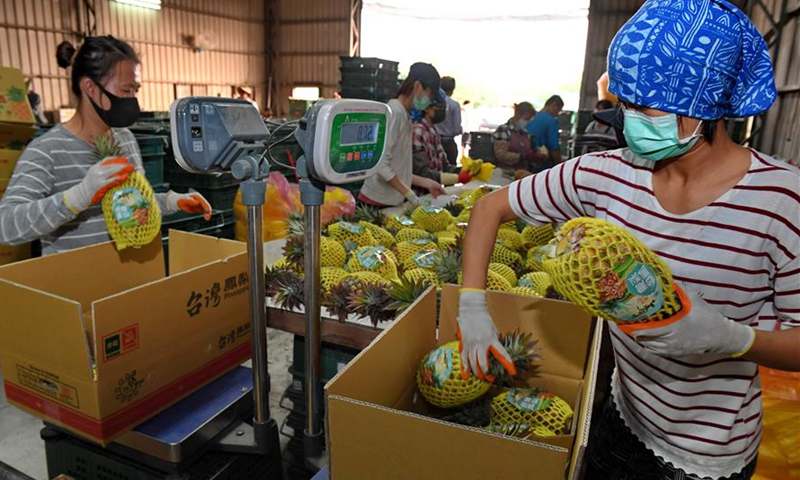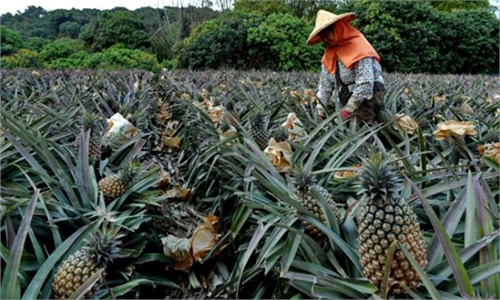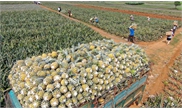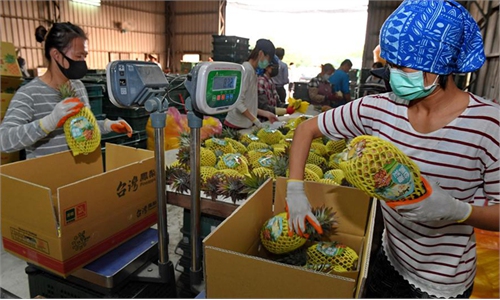
Farmers pack pineapples in Dashu District of Kaohsiung, southeast China's Taiwan, on March 13, 2019. Pineapples in Dashu District of Kaohsiung have entered harvest season. (Xinhua/Zhang Guojun)
The separatist Taiwan People's Party (TPP) on Wednesday put pressure on the island's authority to consider a tough response to the Chinese mainland's ban on importing pineapples from the island, in the latest sign of misleading political hype that risks undercutting the broad economic bond across the Straits.
The TPP's party caucus in Taiwan's "Legislative Yuan" urged the island's ruling authority to come up with a solution and warn the mainland against the use of trade as a political means, the Taiwan-based Central News Agency (CNA) reported on Wednesday.
As of Monday, mainland customs suspended the imports of pineapples from Taiwan after having frequently detected quarantine pests on the tropical fruit since 2020.
The move was announced by the General Administration of Customs in a notice on Friday.
Tsai Ing-wen, the island of Taiwan's regional leader, shared her celebration of Taiwan's pineapple exports to Australia in a Facebook posting last year, but the island's Australia-bound exports of pineapples totaled only 56 kilograms, said the report.
Over the past five years under Tsai's administration, the island's pineapple exports to the Chinese mainland accounted for 90 percent of its total exports of the fruit.
In a sign of misinterpreting the temporary import ban as a political crackdown, the local agricultural authorities "would seek the WTO's help to negotiate with Beijing," the Taipei Times said in a report on Sunday, citing unidentified sources.
Pineapples don't fall under the scope of items covered by the Cross-Straits Economic Cooperation Framework Agreement (ECFA), a preferential trade agreement intended to reduce tariffs, Wu Guoxiong, a lawyer specializing in customs law, told the Global Times.
The ECFA is not a market access-themed pact, so the pineapple issue is not meant to fall under the purview of the agreement, Wu stated, adding that an import ban over biosafety issues doesn't violate ECFA.
Taiwan island joined the WTO in 2001 as a separate customs territory, and its trade disputes with the mainland that are not categorized as ECFA-related issues are referred to the WTO's dispute settlement mechanism, Tang Yonghong, deputy director of the Taiwan Research Center at Xiamen University, told the Global Times.
Tang said that the mainland customs' import suspension over pest concerns is a common practice globally to handle farm produce imports, and it doesn't violate WTO trade rules.
The mainland's suspension of pineapple imports from the island is a precaution to ensure biosecurity and is completely reasonable and necessary, Zhu Fenglian, spokesperson for the Taiwan Affairs Office of the State Council, said on Monday.
The political hype over the ban, as shown by the TPP's claims, also shed light on misguided calls for a push to diversify the island's pineapple exports to new markets including Australia and North America, undermining cross-Straits trade closeness, observers said.
A pineapple exporter in Taiwan told the Global Times that he is expecting "foreseeable losses" from the ban, and farmers are still discussing how to cope with the losses.



